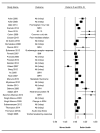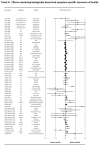Is subjective social status a unique correlate of physical health? A meta-analysis
- PMID: 28726474
- PMCID: PMC5709157
- DOI: 10.1037/hea0000534
Is subjective social status a unique correlate of physical health? A meta-analysis
Abstract
Objective: Both social stratification (e.g., social rank) as well as economic resources (e.g., income) are thought to contribute to socioeconomic health disparities. It has been proposed that subjective socioeconomic status (an individual's perception of his or her hierarchical rank) provides increased predictive utility for physical health over and above more traditional, well-researched socioeconomic constructs such as education, occupation, and income.
Method: PsycINFO and PubMed databases were systematically searched for studies examining the association of subjective socioeconomic status (SES) and physical health adjusting for at least 1 measure of objective SES. The final sample included 31 studies and 99 unique effects. Meta-analyses were performed to: (a) estimate the overlap among subjective and objective indicators of SES and (b) estimate the cumulative association of subjective SES with physical health adjusting for objective SES. Potential moderators such as race and type of health indicator assessed (global self-reports vs. more specific and biologically based indicators) were also examined.
Results: Across samples, subjective SES shows moderate overlap with objective indicators of SES, but associations are much stronger in Whites than Blacks. Subjective SES evidenced a unique cumulative association with physical health in adults, above and beyond traditional objective indicators of SES (Z = .07, SE = .01, p < .05). This association was stronger for self-rated health than for biologically based and symptom-specific measures of health. Almost all available data were cross-sectional and do not allow for strong causal inference.
Conclusions: Subjective SES may provide unique information relevant to understanding disparities in health, especially self-rated health. (PsycINFO Database Record
(c) 2017 APA, all rights reserved).
Figures






References
-
- Adler N. Health disparities through a psychological lens. American Psychologist. 2009;64(8):663–673. - PubMed
-
- Adler N, Epel E, Castellazzo G, Ickovics J. Relationship of subjective and objective social status with psychological and physiological functioning: Preliminary data in healthy, White women. Health Psychology. 2000;19:586–592. - PubMed
-
- Adler N, Singh-Manoux A, Schwartz J, Stewart J, Matthews K, Marmot MG. Social status and health: A comparison of British civil servants in Whitehall-II with European- and African-Americans in CARDIA. Social Science and Medicine. 2008;66(5):1034–1045. doi: 10.1016/j.socscimed.2007.11.031. - DOI - PubMed
-
- Begg C, Mazumdar M. Operating characteristics of a rank correlation test for publication bias. Biometrics. 1994;50(4):1088–1101. - PubMed
Publication types
MeSH terms
Grants and funding
LinkOut - more resources
Full Text Sources
Other Literature Sources

